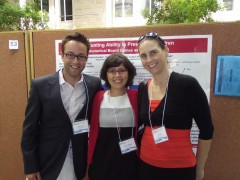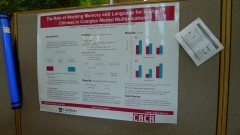
Queens University
Posters:
The Role of Working Memory and the Language Effect for the Bilingual-Chinese in Complex Mental Multiplication
Chang Xu, Ineke Imbo, Chris M. Herdman, Jo-Anne LeFevre; Carleton University, Universiteit Gent, Belgium
The purpose of the present study was to examine whether the role of working memory in complex multiplication for the Chinese differs when responding in first and second language. Participants solved multiplication problems (13 x 6) in two languages under working memory loads. The results showed that participants were faster and more accurate when responding in Chinese than in English. Furthermore, they were more likely to rely on phonological working memory for horizontally presented problems, and visual working memory for vertically presented problems. The results will be discussed in relation to current models of numerical representations and working memory. View Poster
Counting Ability in Preschool Children
Kristina Dunbar, Ozlem Cankaya, Jo-Anne LeFevre, Carla Sowinski; Carleton University
Does playing numerical board games enhance preschool children’s numeracy skills? Fifty children (M = 45 months) played either a linear game, a row game where numbers were grouped by decade, or a colour game. Compared to the colour game, children in the number game conditions showed improved rote counting and number recognition. The row game was most beneficial. Children who could already count past 12 did not show improvements. These findings suggest that the game context must engage children beyond their existing counting ability, and that a game focusing on decade organization can further develop numeracy skills. View Poster
Subitizing Latency—But Not Approximate Number System Acuity— Correlates With Arithmetic Fluency In Adults
Carla C. Sowinski, Jo-Anne LeFevre; Carleton University
We examined relations among approximate number system (ANS) acuity, subitizing latency and measures of addition, subtraction and multiplication fluency in adults (N = 109). The ability to quickly and accurately name small quantities (subitizing speed) was associated with simple symbolic arithmetic performance. However, the ability to accurately compare large quantities (e.g., ANS acuity) was not significantly correlated with arithmetic performance; this finding is counter to recent findings by Lyons and Beilock (2011). Approximate and exact quantity processing in relation to math skill development will be discussed. View Poster
Eye Movement Differences between Retrieval and Procedures in Simple Subtraction
Evan T Curtis, Corrie Bouskill, Jo-Anne LeFevre; Carleton University
Participants (N = 30) solved subtraction problems while their eye
movements were recorded. Participants solved small problems (e.g., 6 – 3) faster and more accurately than large problems (e.g., 17 – 5). Participants also made more fixations and recorded longer gaze duration on large problems than on small problems. On small problems participants looked most often at the center of the screen, consistent with previous research examining eye movements during multiplication. However, on large problems participants looked most often at the operands. The difference in fixation patterns is argued to reflect the use of procedural strategies rather than fact retrieval. View Poster
The relationship between direct retrieval and mental and calculator-based computation in arithmetic: Implications for the Testing Effect
Aryn Pyke, Gary Bourque, Jo-Anne LeFevre; Carnegie Mellon University, Carleton University
The testing effect suggests that attempting to directly retrieve answers during learning improves subsequent recall. The current study further explores whether or not direct retrieval processes tend to proceed in series or in parallel with computation processes in simple arithmetic. If in parallel (race model), might ‘testing effect’ benefits accrue even when answers are computed, either mentally or with a calculator? We also explored whether retrieval attempts might (or might not) be obligatory but instead determined by factors like the degree to which the computation process is inconvenient (e.g., calculator with scrambled keys). Results and implications are discussed.

Evan Curtis, Ozlem Cankaya & Aryn Pyke

Claire’s Poster at the Poster Session